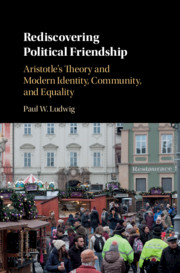Book contents
- Rediscovering Political Friendship
- Rediscovering Political Friendship
- Copyright page
- Dedication
- Epigraph
- Contents
- Preface and Acknowledgments
- Introduction
- Part I Foundations of Friendship
- Part II Where Is Civic Friendship Today?
- Part III A Different Way to View Liberalism
- Part IV Conclusion
- 8 What Is the Use of Civic Friendship?
- Works Cited
- Index
8 - What Is the Use of Civic Friendship?
Sheltering Liberal Practices from the Effects of Liberal Theory
from Part IV - Conclusion
Published online by Cambridge University Press: 12 December 2019
- Rediscovering Political Friendship
- Rediscovering Political Friendship
- Copyright page
- Dedication
- Epigraph
- Contents
- Preface and Acknowledgments
- Introduction
- Part I Foundations of Friendship
- Part II Where Is Civic Friendship Today?
- Part III A Different Way to View Liberalism
- Part IV Conclusion
- 8 What Is the Use of Civic Friendship?
- Works Cited
- Index
Summary
Policies that follow from increased awareness of civic friendship are progressive and socially conservative. Each policy—on fair wage, immigration, and national service—fights the current tendency of citizens to “live down” to the low expectations theorists and policymakers have of them. Our theoretical realism fails to account for the role of ideals in our lived experience. Civic friendship helps us avoid the pitfalls of moralizing and reifying market mechanisms, by giving greater attention to the way wages confer honor—as opposed to bodily welfare and comfort. A norm tethering CEOs’ pay to a fixed multiple of the lowest salaried employee helps workers but would also help the wealthy realize their mistake when they seek, through money, honors that can only be won through civic patronage. Patronage as opposed to philanthropy is local, hands-on giving. Patronage often arises within ethnicities and creates social capital out of the ethnocentricity of immigrant groups. The civic capacity of young people could be increased by a compulsory choice between military service and a civilian corps dedicated to public works projects.
Keywords
- Type
- Chapter
- Information
- Rediscovering Political FriendshipAristotle's Theory and Modern Identity, Community, and Equality, pp. 297 - 326Publisher: Cambridge University PressPrint publication year: 2020

